Faculty of Arts,
Chulalongkorn University
Sorry, Wrong Number
(1948)
Lucille
Fletcher
(March 28, 1912 – August 31, 2000)
Notes
Sorry, Wrong Number was first written and performed as a radio play,
broadcast on May 25, 1943.
148 bed-jacket:
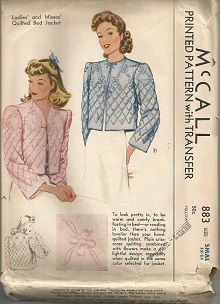
Quilted bed jacket
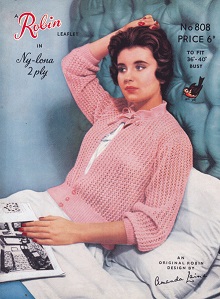
Knit bed jacket
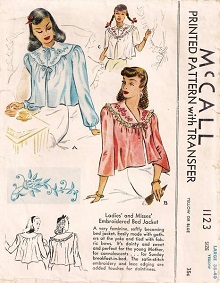
Embroidered bed jacket
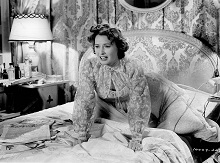
Barbara Stanwyck as Mrs. Stevenson in Sorry, Wrong Number,
directed by Anatole Litvak, 1948.
|
- bed jacket (Merriam-Webster)
a short lightweight
jacket worn over a nightgown often when sitting up in bed
- "Bed Jacket," The Dictionary of
Fashion History, by Valerie Cumming (2010)
A short jacket worn in bed; of various fabrics and often, in
the early to mid-20th century, home-made and/or hand-knitted.
- Hollis Jenkens, "Bed Jacket," Vintage Fashion Guild
(2010).
A bed jacket is a short, below bust or waist length jacket
specifically intended be worn in bed while sitting up. Worn
over the nightgown, the bed jacket can be found in a wide
variety of fabrics and treatments. It is most likely derived
from 19th combing jackets, and was popular into the early
1960s.
- Debbie Sessions, "1940s Sleepwear: Nightgowns, Pajamas, Robes,
Bed Jackets," The Vintage Dancer (2015)
Bed jackets were a nighttime staple in the ’40s. Bed jackets
had two uses. One use was a short covering to wear over
sleepwear while taking care of her nightly beauty routine. The
other use was a light layer of warmth for cool evenings and
mornings. Many movies portray women sitting up in bed, reading
with a bed jacket on.
1940s Knit sweater-like bed jackets called "cuddlies." Popular
colors were white, pale pink, peach and light blue with white
trim.
The style of the time was a cropped jacket with elbow-length
or slightly shorter than wrist length sleeves. It was about
waist-length or a little longer. The jacket was cut straight
and was loose fitting in both the jacket and sleeves. Trim is
abundant, usually in a contrasting color. These jackets could
tie around the neck with a ribbon, close with one button in
the center, or button all the way down. They could be thin
cotton or rayon satin, and were often quilted in winter
weights. Some were also knitted and sweater-like, called
“cuddlies.” Popular colors were white, pale pink, peach and
light blue with white trim.
- "Bed-Jacket," Illustrated
Encyclopedia of World Costume, by Doreen Yarwood (1978)
A modern garment designed as a pretty jacket to wear over a
nightdress for warmth and elegance while in bed.
|
148 switchboard:
153 redtape:
- red tape (Merriam-Webster)
official routine or procedure marked by excessive complexity which
results in delay or inaction
Origin and Etymology of red tape
from the red tape formerly used to bind legal documents in England
Background
Miss Fletcher once
described ''Sorry, Wrong Number'' as an experiment in radio sound effects.
''I grew up in an era when the radio was a wonderful medium for the
imagination,'' she said. ''You could get any effect you wanted with
sounds.''
Her daughter Dorothy Herrmann said Miss Fletcher got the idea for the
drama after an obnoxious well-dressed woman refused to permit her to go
ahead on a supermarket checkout line on Manhattan's East Side when Miss
Fletcher was buying some milk or cereal for one of her children, who was
sick.
''No, you cannot,'' the woman said. ''How dare you?''
The drama, Ms. Herrmann said, was Miss Fletcher's act of revenge.
[...]
In an interview
with The Washington Post, Miss Fletcher once said: ''Writing
suspense stories is like working on a puzzle. You bury the secret, lead
the reader down the path, put in false leads and throughout the story
remain completely logical. Each word must have meaning and be written in a
fine literary style. Mysteries are a challenge, a double task for the
writer, for the reader is aching to solve the puzzle before you do.''
—Lawrence
van Gelder, "Lucille Fletcher, 88, Author of 'Sorry, Wrong Number,'"
The New York Times, 6 Sep. 2000.
Kurt Andersen:
Suspense was an anthology show that ran on CBS radio from 1942 until the
very end of the golden age of radio in the fall of 1962. I think the
narrator of Suspense very early on in the show’s run said it was about
presenting a precarious situation and then withholding the solution
until the last possible moment.
[...]
Kurt Andersen: Lucille
Fletcher who wrote the script wrote Mrs. Stevenson as, frankly, not a
terribly likeable woman.
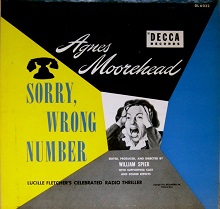 Dorothy Herrmann: My mother came from a working class
family in Brooklyn and she won a scholarship to Vassar College. And as a
poor scholarship student she felt that these very rich girls who came to
school in their limousines—she felt that they snubbed her. And, to make
matters worse, she had a boyfriend who was an upperclass young man who was
studying at Dartmouth. And he had a mother who was very much like Mrs.
Stevenson. And she looked down on my mother. And this made my mother very
miserable. So I think that she was taking a revenge on a lot of people in
her radio play.
Dorothy Herrmann: My mother came from a working class
family in Brooklyn and she won a scholarship to Vassar College. And as a
poor scholarship student she felt that these very rich girls who came to
school in their limousines—she felt that they snubbed her. And, to make
matters worse, she had a boyfriend who was an upperclass young man who was
studying at Dartmouth. And he had a mother who was very much like Mrs.
Stevenson. And she looked down on my mother. And this made my mother very
miserable. So I think that she was taking a revenge on a lot of people in
her radio play.
[...]
Kurt Andersen: When
she’s [Mrs. Stevenson's] attacked in her bedroom Agnes Moorehead
screams. And she worked it out so that her scream would be the exact
pitch of the whistle of the train that was going by her home. I think it
was one of the first times that someone had had the audacity to go on
radio, this national network, and present a story in which the killers
get away.
Dorothy Herrmann: I
think my mother took delight in the end of Mrs. Stevenson, that she’s
trapped by her own invalidism and her own neuroticism, and also the fact
that nobody will believe her.
—Kurt
Andersen, "Sorry,
Wrong Number," Studio 360, WNYC,
26 Nov. 2015.
A clerk-typist for
CBS radio in New York city, Lucille Fletcher prepared the manuscripts of
other playwrights and soon realized that she could probably do better. Her
first story was about a man who drove across the country while being
stalked by the same hitchhiker everywhere. [...] The success of The
Hitch-Hiker raised Fletcher's status at CBS from clerk-typist to
scriptwriter. she didn't waste any time. Her next radio play, Sorry,
Wrong Number, premiered in 1943 on Suspense and quickly
became one of the most legendary radio plays of all time, second perhaps
only to The War of the Worlds.
[...]
Marooned in her
bedroom, Mrs. Stevenson attempts a kind of remote control over her
narrowly confined world by telephone. Although Mrs. Stevenson reaches out
to others, the unfriendly phone system refuses to provide her with a
dialogic partner. She is trapped in a monologic system that not only
isolates her but persecutes her for speaking.
[...]
Agnes Moorehead was
widely praised for her performance in the story. [...] Mrs. Stevenson is
not only neurotic and paranoid but also irritable, sarcastic, ill-natured,
and mean. [...] She is an acoustic spectacle, an eruption of female
hysteria, and Moorehead's ability to capture the unacceptable side of the
female speaking subject seized the imaginations of listeners everywhere
and spurred many to phone CBS requesting additional performances of the
radio play.
Discursive
Deviancy
What was it about
Moorehead's voice that aroused such fascination? The suggestion that a
woman cannot be safe even in her own home was certainly relevant and
compelling; however, as Allison McCracken suggests, Mrs. Stevenson might
be the victim of the story but she was also its "monster." [...] Together,
Lucille Fletcher and Agnes Moorehead test the very limits of deviant
female subjectivity with their hyperbolizing of Mrs. Stevenson as the
madwoman in the attic, creating in the guise of a thirty-minute radio play
the anatomy of a screaming woman.
[...]
Sorry, Wrong
Number was written specifically for Moorehead because Fletcher
wanted an ornery voice for Mrs. Stevenson. Moorehead delivered. [...]
[...] Not only does
she violate the convention of "The Good Wife" as someone who should speak
in a low, soft, soothing, and pleasant voice, but Mrs. Stevenson also
complicates the position of listeners by implicating them in her own
predicament. As Suspense's narrator explains during the program's
introduction, Sorry, Wrong Number is a story of a woman who
"overheard a conversation with death." Mrs. Stevenson herself, in other
words, is a listener. She is engrossed by a mystery, a murder plot, much
the same way the radio audience is tuned in to CBS's thriller. [...]
[...]
[...] The killers
can't hear her, and the phone operator and the police ignore her. Her
husband, by proxy, will apparently silence her. The audience, however,
hears every word. Mrs. Stevenson is up against an information system that
will not acknowledge her voice, as if she spoke the wrong language (which,
of course, she does). Her distress is not only a result of patriarchy but
also of telephony's refusal to admit her into its mediatory network. This
is not what Ma Bell (“The Voice with a Smile”) promised. Period ads
pitched the phone operator as “alert” and “courteous.” “They’re nice
people to do business with,” pledged a 1939 ad for Bell Telephone System.
The phone operator with a “smiling voice” was an invitation to talk,
someone expected to “exercise a soothing and calming effect” on callers, a
woman on hand to help reduce the isolation of other women. [...]
[...]
By grounding the
story in a succession of telephone exchanges experienced by an isolated
woman confined to her bedroom, Fletcher created a narrative that seems
ideally suited to the uniqueness of radio drama. In a Life magazine review
of the broadcast, Sorry, Wrong Number was called “radio’s perfect
script.”43 Fletcher herself had said that she “wanted to write something
which by its very nature should, for maximum effectiveness, be heard
rather than seen,” a play that could only be performed on the air. In
fact, it was originally designed, she wrote, “as an experiment in sound
and not just as a murder story.” The telephone was to be the “chief
protagonist.” And then along came Agnes Moorehead. “In the hands of a fine
actress like Agnes Moorehead,” Fletcher said, “the script turned out to be
more the character study of a woman than a technical experiment, and the
plot itself, with its O. Henry twist at the end, fell into the thriller
category.”
[...]
Mrs. Stevenson
Goes to Hollywood
[...]
Like her
counterpart in radio, Barbara Stanwyck’s Leona Stevenson in the film is
confined to her bed and telephone. But this Mrs. Stevenson is not
invisible. She is, every bit, part of the extravagance that is her luxury
apartment. Leona first appears to the viewer in a medium shot, sitting up
in bed, clutching a large white phone receiver close to her head. It is
evening. The clock on her bedside table reads 9:24. Stanwyck’s Leona wears
a nightgown that repeats the pattern of embroidery on the upholstered
headboard and drapery, as if one with the interior design of the uptown
penthouse room. [...]
[...]
[...] On the phone
to the operator, Leona hears the click of the receiver on the other
extension, and realizes an intruder is in her apartment. She clasps her
hand over her mouth and hangs up, holding back further speech. She stifles
herself. The woman with the masterful voice no longer speaks. In her dying
struggle, Leona pulls the cover from the night table, sending the radio
tumbling to the floor. With the collapse of Leona, radio too takes a fall.
Two agents of auditory mastery are momentarily silenced—the drama’s
protagonist and the very technology that made her possible.
—Jeff
Porter, "Sorry, Wrong Number," Lost Sound: The Forgotten
Art of Radio Storytelling, U of North Carolina P, 2016.
|
Comprehension Check
- Who
is the "client" (149)?
- Sergeant
Duffy says that "Telephones are funny things" (157). What
does he mean by funny?
|
|
Study Questions
- What sounds play a role in
creating suspense in Sorry, Wrong Number and how?
- What is the role of light in the
play? Note lighting design such as spotlight behavior and
light-associated props like the lamp (148, 164) or
flashlight (165). What is the effect of spotlighting? How do
pacing and transition speed of stage lighting (sudden vs.
gradual) contribute to the narrative of the play? What
relationship is created between light and darkness? How does
light define darkness in the play? What is illuminated? What
is in darkness? What significance or meaning does the
light's description of play elements have?
- Consider irony in Sorry,
Wrong Number. You can focus first on an irony or a
scene with irony then connect it to or place it within the
context of the play as a whole. What is ironic? Why is it
ironic? How is the irony set up?
- How is connection conveyed?
- How is disconnection conveyed?
- What is the significance of the
food props? Consider the role of the sandwich (155), coffee
(156), and apple pie (157).
- Consider the function of time in
the play. Notice how time is marked, given or described, by
whom and for what reason. When is time precise and when is
it not? Why? How differently does time move throughout the
play? Does it move at an even pace? How is timing used? What
is the relationship between time and dialogue? In what ways
does time connect different people and things and in what
ways does time disconnect them?
|
Review Sheet
Characters
Mrs. Elbert Smythe Stevenson – "a querulous, self-centered neurotic"
(148); "I'm alone all day and night. I see nobody except my maid [...]
and the only other person is my husband Elbert—he's crazy about me—adores
me—waits on me hand and foot—he's scarcely left my side since I took sick
twelve years ago" (157)
1st Operator –
"Ringing Murray Hill 4-0098" (149)
Chief Operator,
Miss Curtis – "Middle-aged, efficient type, pleasant"
(152); "If it's a live call, we can trace it on the equipment. If it's
been disconnected, we can't" (152)
Sergeant Duffy –
"we'll take care of it, lady. Don't worry" (156); "Telephones are
funny things" (157); "Supposing you hadn't broken in on that telephone
call? Supposing you'd got your husband the way you always do? Would
this murder have made any difference to you then?" (157); "Unless, of
course, you have some reason for thinking this call is phoney—and that
someone may be planning to murder you?" (157)
1st Man – "You know the address. At
eleven o'clock the private patrolman goes around to the bar on Second
Avenue for a beer" (149); "Make it quick. As little blood as possible. Our
client does not wish to make her suffer long" (150); "A knife will be
okay. [...] remove the rings and bracelets, and the jewelry in the bureau
drawer. Our client wishes it to look like simple robbery" (150)
2nd Man, George – "A killer
type, also wearing a hat, but standing as in a phone booth" (149); "slow
heavy quality, faintly foreign accent" (149)
Places
Mrs. Stevenson's bedroom –
"Expensive, rather fussy furnishings" (148)
bed – "A large bed, on which Mrs. Stevenson, clad in bed-jacket, is
lying" (148)
phone booth – "In a phone booth" (149)
Time
night
–
11:00 p.m. – "At eleven o'clock the private patrolman goes around to
the bar on Second Avenue for a beer" (149)
11:15 p.m. – "At eleven-fifteen a subway train cross the bridge. It
makes a noise in case her window is open, and she should scream" (149)
Vocabulary
one-act
setting
props
lighting
sound effects
staging
script, playscript
plot
foreshadowing
suspense
conflict
motivation
coincidence
climax
resolution
character
characterization
dialogue
imagery
movement
pace
point
of view
diction
voice
tone
irony
- verbal irony
- dramatic irony
- situational irony
symbol,
symbolism, symbolic
theme
murder
terror
telephone
communication
connection,
connectedness; community; company; companionship
detachment;
isolation; aloneness
freedom
and confinement; possibilities and limitations
voice,
voicelessness
helplessness
frustration
arrogance
woman
in peril
illness;
disability; invalidism
life
and death
Sample
Student
Responses to Lucille Fletcher's Sorry, Wrong Number
Response
1::
|
|
Somchai Lee
2202234 Introduction to the Study of
English Literature
Acharn Puckpan Tipayamontri
September 15, 2018
Reading Response 2
Title
Text.
|
|
Reference
| Links |
Critical Articles
- Wendy Haslem, "Sorry, Wrong Number," Senses
of Cinema, vol. 37, 2005.
- David Crane, "Projections and Intersections:
Paranoid Textuality in Sorry, Wrong Number,"
Camera Obscura, vol. 17, no. 3, 2002, pp.
71–112. (Chula access)
- Amy Lawrence, "Sorry, Wrong Number: The
Organizing Ear," Film Quarterly, vol.
40, no. 2, 1986–87, pp. 20–27. (Chula access)
|
| Media |
|
- Sorry, Wrong Number, by Lucille
Fletcher, performed by Agnes Moorehead, Suspense, CBS
(1943 original West Coast broadcast; 29:56 min.)
|
|
- Sorry, Wrong Number, by Lucille
Fletcher, performed by Agnes Moorehead, Suspense, CBS
(1948 radio play, 28:35 min.)
|
|
- Sorry, Wrong Number, by Lucille
Fletcher, performed by Barbara Stanwyck and Burt
Lancaster, Lux Radio Theater, CBS (1950 radio,
55:51 min.)
|
|
- Sorry, Wrong Number, directed by
Anatole Litvak, performed by Barbara Stanwyck and Burt
Lancaster, Paramount (1948 film trailer; 2:38 min.)
|
|
- Kurt Anderson, "Sorry, Wrong Number," produced by
Devon Strolovitch, Studio 360, PRI (2015
retrospective on the radio play, includes interview with
Fletcher's daughter; 7:45 min.)
|
|
- On the Air: The Story of Radio
Broadcasting, Westinghouse (1944; 22:52 min.)
|
|
- Back of the Mike, Jam Handy
(1938 documentary about how radio drama during the gold
age was done; 9:15 min.)
|
|
- A History of the Telephone,
directed by Ronald Spencer, Pacesetter (1980; 19:10 min.)
|
|
- Operator,
directed by Nell Cox (1969 documentary; 17:00 min.)
|
|
- Switchboards, Old and New, Bell
Systems (1932 documentary; 13:21 min.)
|
Reference
Fletcher, Lucille. Sorry, Wrong Number.
24 Favorite One-Act Plays, edited by Bennett Cerf and Van H.
Cartmell, Broadway Books, 2000, pp. 147–65.
Further
Reading
Fletcher, Lucille. Sorry, Wrong Number
and The Hitch-hiker: Plays in One Act. Dramatists Play Service,
1952.
Home
| Literary Terms | English Help
Last updated September 25, 2018




